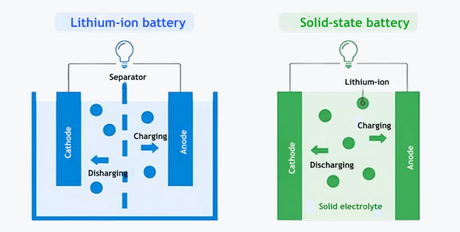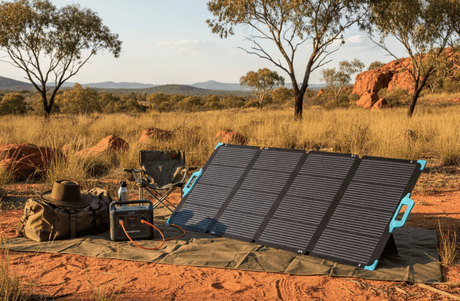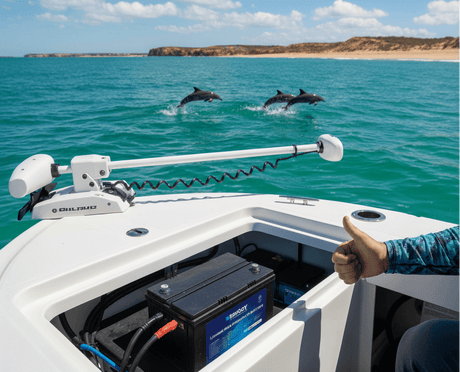The use of solar panels is not limited to fields and roofs; you can now benefit from solar energy while travelling, hiking, camping, during emergencies, or engaging in outdoor activities. This is where portable solar panels play a crucial role.
The current market offers a range of solutions to power your devices and appliances using solar energy. One of the key benefits of portable panels is that they can replace a generator, as they provide unmatched mobile solar energy.
Portable solar panels are especially useful when you need power but you don't have access to the utility grid, a generator, or any other source of power. Unlike traditional solar panels, portable panels are not fixed permanently. Read more to know how they are different from conventional panels, where you can use them, what benefits they offer, and more.
How are Portable Solar Panels Different from Fixed Panels?
Several factors distinguish portable panels from fixed solar panels, including installation, mobility, efficiency, durability, and cost. The table below provides a brief overview of the potential differences between the two variants of solar panels.
| Feature | Portable Solar Panels | Fixed Solar Panels |
| Installation | No installation required | Mounted permanently on rooftops, ground, boats, and RVs |
| Mobility | Easy carrying and setting up | Stationary (can't move) |
| Output Power | Low | High |
| Durability | Less durable | More durable |
| Maintenance | Requires frequent positioning | Minimal |
| Best Use | Road trips, emergency backup power, travel, hiking, camping | Homes, boats, RVs, off-grid living, commercial applications |
| Price | Low upfront cost | High upfront cost |
Let's now look at these factors in more detail.
1. Installation and Mobility
When it comes to installing fixed solar panels, a permanent setup is required. It includes wiring, brackets, and labour. On the other hand, portable solar panels don't need such installation. Moreover, they are compact and lightweight, making them ideal for emergencies and road trips.
As a user, you can simply place a portable panel directly in the sunlight to get the desired amount of power. If you are looking for on-the-go energy, there is nothing more versatile and efficient than using portable solar panels.
2. Power Output and Efficiency
Solar panel efficiency and output power are two more factors that make portable panels different from their fixed counterparts. Since fixed solar panels are larger and receive better sunlight for long hours, they are much more efficient than portable panels. Moreover, portable panels are considered ideal for small-scale applications, as they generate less power. Common uses include charging laptops, mobile devices, or powering camping gear.
3. Cost and Durability
Though portable panels are more affordable than fixed solar panels, they are relatively less durable. Frequent handling and exposure may damage these panels faster. In contrast, the upfront costs of fixed solar panels are higher, but they are incredibly durable and offer long-term energy solutions and savings.
How Much Power Can a Portable Solar Panel Generate?
A portable panel is rated for the maximum electricity it can produce per hour. For example, a 200W portable panel suitcase can generate 200 watts of power for every hour it is exposed to peak sunlight. Different models may have different rated power. At the same time, the rated power may also vary from one manufacturer to another. The formula below helps you calculate the output power in ideal conditions.
Output Power in Watt-Hours = Panel Wattage x Peak Sun Hours
For example, if a 200W portable solar panel receives sunlight for 5 peak hours a day, it will be able to generate 1,000Wh of energy daily.
Remember, when it comes to estimating actual power production, different factors come into play, such as installation angle, sunlight exposure, temperature, and panel quality, of course. One more thing to keep in mind is that portable panels, like traditional solar panels, can only meet your energy needs during the daytime.
If you want to benefit from solar energy at night or during cloudy weather, don't forget to connect your portable panels to a reliable solar inverter, a premium-quality charger controller, and a dependable set of batteries.
How to Choose the Right Portable Solar Panel?
You are now well familiar with what makes portable solar panels different from fixed panels. You may be wondering how to select the best panel to meet your energy requirements. Right? Well, below is a comprehensive checklist to help you find the right fit for your needs.
1. Cell Quality
It is crucial to consider the quality of the photovoltaic cell when purchasing a 12V portable panel. Lower-efficiency cells generate less power, whereas higher-efficiency cells produce more electricity. Three types of cells are used to manufacture solar panels, e.g., monocrystalline, polycrystalline, and amorphous.
Monocrystalline cells perform well in direct sunlight, polycrystalline cells are known for their dependable efficiency in low-light conditions, and amorphous cells are made from flexible, thin-film panels. The multicrystalline technology offers higher output power. If you want to buy high-quality portable panels, explore Renogy portable solar panels, which carries a huge variety of panels from 30W to 400W.
2. Solar Components
Though solar panels are an integral part of the whole setup, the overall production largely depends on other components, such as hinges, frames, and cabling. Heavy-duty latches, legs, and frames make your system more sturdy.
Similarly, hail-proof solar cells and rust-proof aluminium components are ideal to withstand challenging weather conditions in Australia. Make sure you always buy panels or other solar equipment from a reputable brand like Renogy to avoid any sort of inconvenience during use.
3. Solar Size
Make a list of the devices you want to run or charge during your trip and calculate the daily power usage. Then, estimate your daily power consumption by multiplying the total amps per hour by the number of hours you want to use the devices daily. Once done, multiply your daily consumption by the number of days you plan to stay away.
Remember, you should have an appropriately-sized battery to meet your energy needs at night or when the weather is cloudy or rainy. If your panels can't fully charge your battery, you may survive during shorter trips. If you plan to go on extended trips, ensure your solar panels can fully charge the battery to avoid any future inconvenience.
4. Find the Right Charge Controller
The power produced by a portable solar panel should pass through a charge controller or solar regulator before it reaches the battery. This is because unregulated voltage from panels can damage your batteries, so they need to be regulated. A good charge controller prevents batteries from experiencing various issues, like overcharging.
5. Warranty
Never forget to check the warranties of portable panels before you make a purchase. Good panels always come with a minimum two-year product warranty, covering replacement and repair, as well as a 25-year performance warranty. Investing in high-quality portable panels gives you peace of mind.
Potential Applications of Portable Solar Panels
Different panels are built for different purposes. Below is a list of common uses of portable panels.
1. Charging Small Devices
If you are on a road trip, you can easily charge your small devices (such as lights, laptops, cameras, LCDs, and mobile phones) using these panels. Some advanced systems offer wireless charging features, making them useful during power outages. Small-scale portable solar systems usually include panels, lights, and a battery. Some systems enable you to charge batteries from grid power (if accessible).

2. RV Travel and Camping
If you are travelling in an RV, boat, or are on a camping trip, portable panels will help you power various types of loads. Such systems come with a charge controller, battery, and solar inverter. The configuration of some portable solar systems is similar to that of portable solar generators. Plus, they can deliver power during outages to complement your trip.

3. Remote Work
If you are a remote worker or digital nomad, you can easily charge your laptops and other electronic gadgets while working in remote areas. Remember, portable solar setups may not be sufficient to power energy-hungry devices. This is where you will need a consistent power supply, either from a portable generator or the utility grid.

What Portable Solar Panels Can Run?
It is important to consider the devices or appliances you want to power with a portable solar system before investing in it. Portable systems are more suitable for energy-efficient devices, including but not limited to computers, laptops, mobile phones, and navigation devices.
You can also power a range of appliances with a portable setup, such as camping refrigerators, radios, portable speakers, fans, LED lights, digital cameras, lanterns, and the list continues.
What Portable Panels Can't Run?
Now that you know what portable solar panels can power, it is time to learn what you can't power from these panels. Portable panels are not suitable for high-power appliances, like electric heaters, refrigerators, air conditioners, washing machines, and microwave ovens.
Similarly, they can power large electronic devices, including but not limited to home theatre systems, desktop computers, gaming consoles, and energy-hungry televisions. At the same time, you can't run heavy-duty tools with portable panels, like industrial equipment.
Moreover, portable panels will not help you run the appliances that draw high startup power. Furthermore, these panels will not be suitable for the appliances that consume more power continuously.
Pros and Cons of Portable Solar Panels
Let's first explore the benefits portable solar panels offer.
- They don't need a supply from the utility grid to power your appliances or charge your devices.
- They are easy to carry (due to compact design and lightweight structure) and can be installed anywhere you want.
- You can position the panel as you like and adjust its angle to maximise sunlight reception and produce the maximum amount of power during peak sunlight hours.
- Portable panels are great for users who don't want to invest a significant amount in fixed solar panel rooftop systems.
- These panels can easily run your small devices during power outages, cloudy days, or at night.
- They provide RV users with an affordable energy solution compared to paying a fee for a campground where electricity is charged separately.
Along with a range of benefits, portable panels also have some limitations, as given below.
- Since portable panels are not fixed, you have to set them up every time you want to use them.
- They are prone to theft and severe weather conditions in Australia.
- Portable panels are less durable and come with a shorter lifespan compared to fixed solar panels.
- These panels come with shorter warranties than fixed panels.
- They can't run energy-hungry devices.
Final Words
Though portable solar panels can't power an entire house, they are capable of charging your small devices (such as phones, laptops, lights, and fans) when you need them the most, even during power outages. These solar panels have become a great energy solution for anyone who values energy on the go, like RV owners, travellers, and campers.
Portable panels deliver power between 30W and 400W, making them suitable for charging your mobile devices or laptops, as well as running mini camping refrigerators. The best part? Convenience and mobility make portable panels stand out in the recent market. You can create a reliable off-grid power setup by selecting the right portable panel, a charge controller, and a battery.
FAQs
What solar panel do I need for camping?
For basic camping, a 100W-200W portable solar panel should be sufficient to run fans and lights, as well as charge mobile devices. If you want to power multiple devices, camping fridges, and CPAP machines, consider buying a 200W-400W panel from a trusted seller like Renogy.
Can a portable solar panel power the whole house?
No, not at all. Portable panels are not built to meet the energy requirements of an entire house. They are good for small and energy-efficient appliances, backup power, RVs, and camping gear. Fixed solar panels are the best choice to get consistent power to run the whole house.
Can I charge a car battery with a portable solar panel?
Yes, you can. A 50-100W portable panel can easily charge a 12-volt car battery. Remember to connect the panel with a charge controller before connecting it to your car battery. Doing this will ensure the battery receives regulated voltage.









![What Is a DC to DC Battery Charger [Comprehensive Guide]](http://au.renogy.com/cdn/shop/articles/IMG_3829_bd86de74-31d6-49fd-b9d5-265bb723091d.jpg?v=1757582605&width=460)